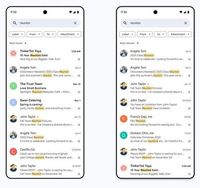Google has announced a significant change to its Gmail search functionality that shifts how email results are prioritized. Instead of merely sorting by recency, the new AI-powered search feature now emphasizes relevance, using various factors to provide users with a customized experience.
As of March 21, 2025, Gmail users on both mobile and web have been introduced to this new system that incorporates email recency, previously clicked emails, and frequent contacts to aid in search results. Google aims to streamline the process of finding important messages while reducing the scroll-time through potentially irrelevant email threads.
Previously, users were accustomed to the chronological order of emails, with the latest messages always appearing at the top of their search results. However, this new feature might require some adjustment. With AI in play, Gmail aims to present the most pertinent results for specified queries, including older but significant emails that would have otherwise been buried in a sea of recent correspondence.
The switch to this more personalized search function has sparked a mixture of reactions among users. While some are optimistic about the potential benefits, such as getting to vital emails quicker, others have expressed concerns that the change could complicate their established search routines.
“This change might actually be helpful,” a user noted about their experience with the new search option. “In particular, I found that the new search experience worked well with messages that were definitely not recent.”
One reported instance involved searching for the term “graduation,” where sorting by recency returned irrelevant results from recent newsletters. Users found the new relevance-based search yielded personal emails that even varied in wording, showcasing previous communications regarding graduations, offering a more tailored experience.
Google is allowing users to toggle between the two sorting options. By clicking a dropdown arrow next to the search results labeled “Most relevant,” users can switch back to “Most recent” if preferred. This flexibility aims to alleviate any confusion, ensuring that individuals still have a way to access the traditional chronological layout they’re accustomed to.
The adaptations have been rolled out globally, initially for personal Google accounts, with plans to extend this upgrade to business accounts in the future. Feedback from users is still emerging, with many expressing varying preferences for the new feature. For some, the reliance on AI to filter search results raises concerns about misinterpretations that could lead to searching specific emails leading to frustration.
Interestingly, Google has introduced other AI-related features aligning with this update. An “Add to Calendar” button, powered by their Gemini AI, has been added to Gmail to facilitate easy event scheduling from emails.
In this era of perpetual digital correspondence, effective search tools are vital for managing the flood of emails. While the transition to a relevance-focused search may take some getting used to, it represents a broader trend towards enhancing user experience through intelligent algorithms. The full impact of these changes on Gmail user habits and productivity will be understood as more feedback is collected.
In conclusion, Google’s new AI-powered search function exemplifies the technological strides towards personalizing digital interaction. As users adapt, it will be essential to see how this new method influences their engagement with Gmail and whether the anticipated benefits materialize over time.





